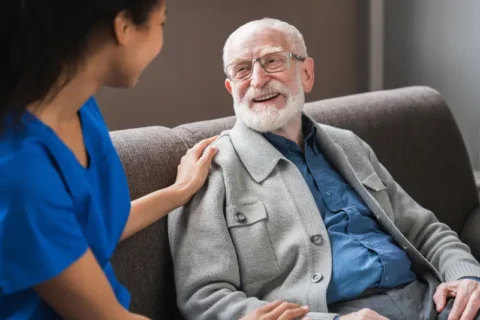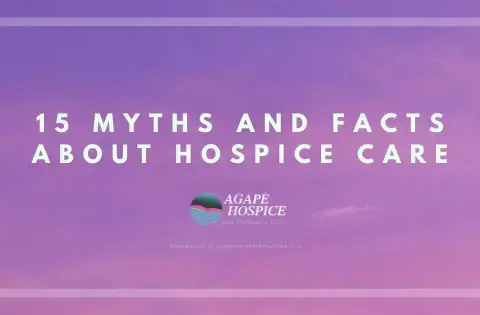Bringing Families Together During Hospice Care
What to Say to Someone Who Has Family in Hospice
Caring for a loved one in hospice can be one of the most challenging and emotional experiences a person might face. For those on the outside looking in, finding the right words to say to someone in this situation is also difficult. Your support can mean the world to someone coping with the ups and downs of hospice care, but knowing what to say (and what not to) is key to providing meaningful comfort. The team at Agape Hospice & Palliative Care has served countless hospice patients and their families in Los Angeles and Orange Counties, and we can help you understand how to support them. Here are some ideas for what to say to someone with a family in hospice.
Use Phrases That Offer Comfort
When you talk to someone with a family member in hospice, try to focus on phrases that show you care. Acknowledge their feelings and take an empathetic approach. While there’s no one “right thing” to say, here are a few ideas to make your support clear:
“I’m Here for You”
Simply letting someone know you’re here and ready to offer support can help immensely. Family members of hospice patients often feel alone and overwhelmed. This short phrase lets them know they have a support system.
“How Are You Doing Today?”
Asking someone how they’re doing can make a big difference, too. This question acknowledges their emotional load without forcing them to address the situation in broad terms. By asking about “today,” you make it easier for them to focus on the present moment.
“Do You Want to Talk About Your Loved One?”
This can be a great conversation starter and a way for the person to hold space for their loved one. The specific phrasing also gives the person the option to decline if they aren’t ready.
“What Can I Do to Support You?”
Offering specific help shows your willingness to ease some of their burdens. Whether running errands or lending a listening ear, this question lets them know you are ready to take action to help them if needed.
Actions Speak Louder Than Words
While words are important, sometimes actions can communicate care even more effectively. Here are some supportive gestures your friend or loved one will likely appreciate:
- Cook a Meal—When dealing with hospice care, simple tasks like cooking may feel impossible for caregivers. Dropping off a meal or offering delivery gift cards can ease some of their stress.
- Offer Help With Errands— Whether it’s mowing the lawn, babysitting, or walking their dog, lending a hand with day-to-day tasks can free up valuable time and energy.
- Listen Without Judgment—Just sitting with them and letting them talk may be the most helpful thing you can do. Sometimes, people just need someone to hear them out without jumping in to “fix” things.
- Send a Thoughtful Message—Don’t underestimate the power of a handwritten note, a heartfelt email, or even a meaningful text message. These small gestures remind them that they’re in your thoughts.
- Give a Small Gift—Don’t get carried away with too many items, but a small gift can show you deeply care about your friend or loved one. Some good gifts for families of hospice patients include framed photos, flowers, or gift baskets.
What to Avoid During Your Conversation
Even with the best intentions, some phrases can cause unintended hurt. It’s important to avoid inadvertently complicating your friend or co-worker’s grief or pain. Everyone has different sensibilities, and it pays to consider what this specific person may not appreciate. Here are a few phrases we recommend avoiding:
“Everything Happens for a Reason”
While meant to console, this phrase can feel dismissive of their pain. Instead, focus on empathy and validation.
“I Know How You Feel”
Even if you’ve had a similar experience, everyone’s emotions and journeys are unique. Instead, encourage them to tell you about their feelings and how you can help.
“At Least They Lived a Full Life”
Mentioning their loved one’s “full life” minimizes their grief, regardless of age.
“They’re in a Better Place”
Not everyone will find comfort in this—especially those who may not share the same beliefs. Focus on being present for your friend rather than making assumptions.
Be Sure to Respect Their Boundaries
You can probably think of a few times in your life when you didn’t want to talk about something. As you try to support someone with family in hospice, make sure to respect their boundaries concerning what they want to talk about. Never pressure them to have a conversation, and don’t take it personally if they’d rather not speak right now. Refrain from offering unsolicited advice—sometimes quiet support is much more appreciated!
Here to Help You Provide Support
Agape Hospice & Palliative Care is here to support families of people in hospice care. We offer a range of services to ensure a smooth experience that leaves everyone feeling cared for. Contact our compassionate team today to learn more about what we provide.


